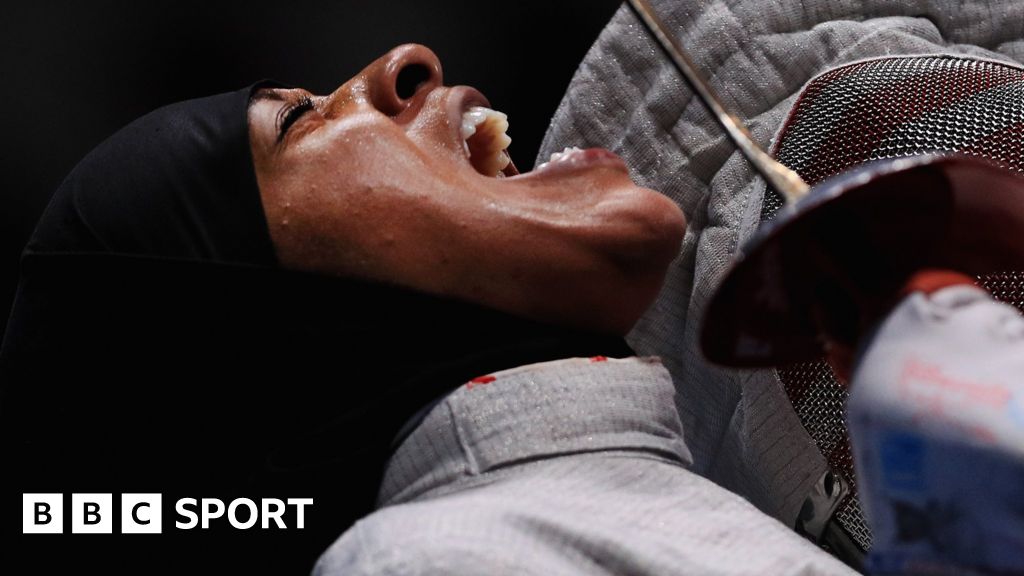[ad_1]
“The ban on the hijab [a type of headscarf that covers the head and neck, but leaves the face clear] is the consequence of two discriminations: it’s islamophobia, but additionally gender discrimination,” says Veronica Noseda, who performs soccer for Les Degommeuses, a Parisian soccer membership set as much as battle discrimination.
Assile Toufaily, who moved to Lyon in 2021 having performed soccer at worldwide degree for her native Lebanon, agrees.
“It is not likely concerning the French society, it is the federal government,” she says.
“There’s a hate on Muslim folks throughout these previous couple of years in France and it is proven in sport.”
This summer time and the arrival of the Olympics in Paris would be the clearest sporting demonstration of a particular and divisive French idea.
Liberte, egalite, fraternite, which first appeared throughout the French Revolution, could be the most well-known expression of what France aspires to. It seems on the entrance of the structure, on cash, on stamps and on public buildings.
Much less well-known, and more durable to translate, is one other key tenet of the French republic: laicite.
Most frequently translated as secularism in English, laicite doesn’t stipulate that France’s folks ought to drop any spiritual customs or symbols, however, as a substitute, that state and public establishments must be expressly freed from them.
It’s an thought that’s keenly contested in France, significantly within the wake of a raft of terrorist assaults over the previous decade and a parallel resurgence in far-right politics.
French President Emmanuel Macron has discovered himself defining the time period many times.
“The issue is not laicite,” he stated in a speech in October 2020.
“Laicite within the French Republic means the liberty to imagine or not imagine, the opportunity of practising one’s faith so long as regulation and order is ensured.
“Laicite means the neutrality of the state. Under no circumstances does it imply the elimination of faith from society and the general public enviornment. A united France is cemented by laicite.”
A 2004 regulation tried so as to add some readability to the idea, banning “ostentatious” spiritual symbols from state colleges, with out naming particular examples.
Whereas Sikh turbans, Jewish kippah and enormous Christian crucifixes have been interpreted as falling the flawed facet of laicite, a lot of the debate has targeted round head coverings among the many largest Muslim inhabitants of any nation in Western Europe.
In September, French sports activities minister Amelie Oudea-Castera – a former skilled tennis participant who misplaced to Martina Hingis within the Wimbledon juniors semi-final in 1994 – confirmed that the French Olympic workforce, as an establishment representing and funded by the French public, is certain by laicite.
“It means absolute neutrality in public providers,” she stated. “The France workforce is not going to put on the headband.”
Athletes from different nations shall be free put on spiritual symbols within the Paris 2024 athletes’ village as they want. Nonetheless members of the French workforce, if they’re to abide by their nation’s guidelines, cannot.
The stance has been criticised by some worldwide our bodies.
“No-one ought to impose on a girl what she must put on or not put on,” stated a spokesperson for the United Nations Human Rights Office., external
“Prohibitions on the carrying of spiritual headscarves in public areas violate Muslim ladies’s rights,” added human rights charity Amnesty Worldwide.
In France nonetheless, the ban carries appreciable help.
“It’s a difficult and really, very delicate subject,” says Sebastien Maillard, an affiliate fellow at assume tank Chatham Home who has reported on French politics and society for a lot of his profession.
“Once I moved from Paris to London, that was one of many principal variations. In the UK faith is displayed fairly comfortably, whereas in Paris it’s usually seen as one thing extra provocative.”
Maillard factors to a different, smaller, controversy involving Paris 2024’s exclusion of spiritual symbols.
In March the Sport’s official poster – a stylised picture of Paris’ landmarks coming collectively to kind a stadium – was unveiled.
The artist omitted the golden crucifix that stands on high of the Lodge des Invalides, sparking dialogue as to how strictly the Video games – which is able to the associated fee French taxpayers a number of billion euros – persist with the ideas of laicite.
“The controversy immediately extra usually focuses round a Muslim group, one that desires to be absolutely a part of French society but additionally comply with faith in its personal method,” says Maillard. “We have now this debate again and again about how that matches.
“The French republic was partly based on a rejection of Catholicism and it feels threatened every time faith impinges on it. There’s a sturdy worry, significantly amongst older generations, of faith exerting affect over society and the state.”
The controversy performs out in areas the place these demographic variations are most pronounced – in schooling, but additionally sport.
Throughout final yr’s interval of Ramadan – a month-long quick noticed between dawn and sundown by Muslims – the French Soccer Federation (FFF) despatched out an edict to referees to not pause matches to permit gamers to interrupt their quick, saying these interruptions “don’t respect the provisions of the statutes of the FFF”.
This yr, with Ramadan coinciding with a global break, the FFF confirmed that it might not alter the timing of meals and practices to accommodate Muslim gamers, successfully stopping them from fasting whereas in camp with France’s age-grade and senior groups.
Lyon midfielder Mahamadou Diawara left France Below-19s’ get-together, reportedly because of the restrictions., external
One other proficient prospect in one other sport, basketball participant Diaba Konate, who has represented France at under-23 degree, has left for the USA, saying the ban on her carrying the hijab has left her “heartbroken”., external
Even in low-level native matches, feminine Muslim gamers are often banned from carrying a headband, on the premise that the leagues are organised and run by public our bodies. Protecting scrumcaps – a work-around answer some gamers have tried – have additionally been deemed incompatible with the foundations by some referees.
The appliance of laicite to sport’s grassroots signifies that hijab-wearing athletes have often compromised or dropped out earlier than reaching the largest stage.
However this summer time will set their dilemma within the starkest phrases: selecting between carrying a nationwide workforce equipment at Paris 2024 and an expression of a private religion.
Elsewhere in sport, expectations have modified.
Morocco defender Nouhaila Benzina made historical past finally summer time’s Ladies’s Soccer World Cup.
Following Fifa’s 2014 rule change to permit the carrying of head coverings for spiritual causes, she grew to become the primary particular person to put on a hijab on the World Cup when she took to the sector in opposition to South Korea.
At Rio 2016, fencer Ibtihaj Muhammad made headlines when she grew to become the primary American to compete on the Olympics whereas carrying a headband. She was later one of many athletes used to launch a hijab made particularly for sport by a worldwide American sports activities model.
One other athlete to win a medal at these Video games whereas carrying a head overlaying – Iran’s taekwondo participant Kimia Alizadeh – has since emigrated to Germany, the place she criticised the Iranian authorities’s coverage of “obligatory hijab”.
She competed on the Tokyo Video games in 2021 below the flag of the Refugee workforce and with out a spiritual head overlaying.
[ad_2]
Source link





